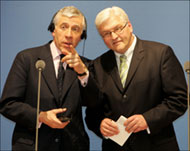Annan: Iran still keen on nuclear talks
Kofi Annan, the UN Secretary-General says Iran is still interested in talks with European nations despite its decision to resume sensitive nuclear fuel research.

After a phone conversation with top Iranian nuclear negotiatior Ali Larijani on Thursday, Annan said he was told that the Iranians “are interested in serious and constructive negotiation but within a time frame”.
Earlier during the day, a senior Iranian official said he believed that a standoff over its nuclear programme could be resolved diplomatically, in a surprisingly mild response to the European decision to push for UN Security Council action.
“Iran still believes diplomacy could be productive,” Hossein Entezami, the Supreme National Security Council spokesman, said in a statement broadcast on state television hours after the foreign ministers of Britain, France and Germany said they had decided to stop negotiating with Iran and refer the country’s nuclear programme to the UN Security Council.
“Iran pursues its nuclear research activities in the framework of the International Atomic Energy Agency regulations and under the supervision of the agency. So there is no reason for challenging Iran’s rights in the field of nuclear fuel,” Entezami said.
Conciliatory tone
|
“Iran still believes diplomacy could be productive” Hossein Entezami, |
While Iran frequently denounces the West when it comes under pressure, Entezami avoided aggressive language and urged the Europeans not to challenge the Iranian people’s demand for nuclear energy. He said the West would be wrong to lead diplomatic channels to a dead end through “unwise decisions”.
Earlier, the European foreign ministers had met in Berlin, Germany, to discuss Iran’s nuclear programme in view of Tehran’s decision on Tuesday to break the seals of the IAEA, the UN nuclear agency, on some equipment at its Natanz uranium enrichment plant and resume work.
While Iran has stressed it will not resume uranium enrichment, the IAEA in Vienna, whose inspectors oversaw the cutting of the seals, said there would be some small-scale enrichment – a process that can produce material for nuclear reactors or bombs. The three European countries have been negotiating with Iran with the aim of persuading it to abandon enrichment.
After their meeting, the foreign ministers said negotiations with Iran had reached a “dead end” and they would call for a meeting of the IAEA to refer Iran to the UN Security Council, which has the power to impose sanctions on the country.
EU statement
 |
|
European foreign ministers want |
In a joint statement, the ministers cited Iran’s “documented record of concealment and deception” and charged its government seems “intent on turning its back on better relations with the international community”.
Frank-Walter Steinmeier, the German Foreign Minister said: “The time has come for the UN Security Council to become involved.” The three ministers did not say what action the Security Council should take.
Later on Thursday, Condoleezza Rice, the US Secretary of State expressed support for the European move and called on the United Nations to demand that Iran halt its nuclear programme. But she also declined to say what steps the Security Council should take.
Iran’s move has “shattered the basis for negotiations”, Rice said.
Rice also told CBS Evening News that the United States did not have on its agenda the option of military action against Iran to curb its nuclear programmes “at this point”.
Asked if the United States ruled out using force to stop
Iran in what Washington says is its pursuit of a nuclear bomb,
Rice said: “The president of the United States never takes any of his options off the table and nobody would want the president to do that.”
“We are on a diplomatic track and it’s not on the agenda at this point to move from that diplomatic track,” she added.
Iranian defiance
The United States accuses Iran of secretly trying to develop nuclear weapons, a charge Iran denies. Iranian radio and television did not initially report the European decision, but in a late night bulletin on Thursday the television broadcast pictures of the Berlin press conference with comments by the British and German foreign ministers.
The newscaster added: “All Iranians are united in pursuing the nuclear programme.” The channel then screened interviews with several people in the street and three university professors, who all said Iran should continue the programme. The interviews appeared to have been conducted before the European decision was announced.
Hamid Reza Asefi, Iranian Foreign Ministry spokesman has repeatedly said Iran is not worried about the threat of UN sanctions as such measures would hurt the Europeans more than Iran.
Stand-off
|
“[Iran’s move has] shattered the basis for negotiations” Condoleeza Rice, |
Before the Berlin meeting, Hashemi Rafsanjani, the Iranian former President told state radio that Iran’s stand-off with the West had become “very serious and has reached its climax”.
He did not elaborate on the confrontation, but he reiterated that Iran would continue developing its nuclear technology. Rafsanjani, who now heads the powerful Expediency Council, said his country had decided to “ignore colonial taboos” to make use of advanced technology that the West is denying to the Third World.
Rafsanjani, who was president of Iran in the 1990s, lost to President Mahmoud Ahmadinejad in the run-off elections last June. In the election, he ran as a moderate, compared to the ultra-conservative Ahmadinejad. But the nuclear policy is a point of national pride for many Iranians. It is perhaps the only issue that is supported by both sides of the reformist-conservative divide.